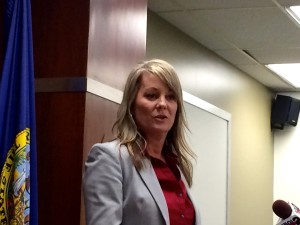New state superintendent Sherri Ybarra offered a glimpse into her 2015 legislative agenda Tuesday — and staked out differences with the State Board of Education, and her predecessor.
Ybarra wants Legislature to slow down on a controversial tiered teacher licensing plan, one of the State Board’s top priorities.
She also wants lawmakers to put more operational money into school district coffers, to reverse recession-era budget cuts. In his final budget blueprint, outgoing state superintendent gave this idea only tepid support.

In her first news conference as superintendent, the Republican Ybarra said the GOP-dominated Legislature should slow down on tiered licensure. The original plan drew fire from the Idaho Education Association and some educators, who objected to tying licenses and teacher livelihoods to local evaluations and test scores. The IEA remains opposed to the rewritten plan.
Ybarra said the current plan looks “pretty good,” and is part of the formula for recruiting and retaining quality teachers. But district officials still harbor questions about the plan, Ybarra said. So, like the IEA, she urged the Legislature to slow down the process.
Similarly, Ybarra wants to slow down the teacher “career ladder” that is tied to the tiered licensure plan. This proposal, also endorsed by the State Board, would boost starting teacher pay from $31,750 to $40,000 over five years, with top teacher salaries maxing out at $54,000 to $58,000. Ybarra suggested allowing some school districts to pilot the career ladder.
While Ybarra is favoring a go-slow approach, the State Board is making a concerted push to pass both plans in 2015. State Board member Rod Lewis, a leading tiered licensure advocate, has said the state “has a once-in-a-generation opportunity” to convince legislators to boost teacher pay — but only if the state revamps its accountability measures by adopting a tiered licensure structure. And tiered licensure will likely take the form of an agency rule, not a bill, which means the plan need only pass the House or Senate education committee to go into effect.
Ybarra divulged no details about her budget plans, but said she would press for an increase in operational funding. This is a high priority for districts since they have the discretion to use the money for staffing, salaries and benefits or transportation and utilities.
“We are definitely looking at increased operational funding,” she said, “That is one of our priorities.”
The 2014 Legislature restored $35 million in operational funding, acting on recommendations from Gov. Butch Otter’s education task force. However, it will take an additional $78 million to restore this budget to pre-recession levels — and in his 2015-16 budget blueprint presented in September, former state superintendent Tom Luna recommended only a $10 million increase.
Ybarra said she would boost this request. She said she would discuss more details after Monday, when Otter unveils his 2015-16 budget request. And on Jan. 29, Ybarra will present her first K-12 budget proposal to the Legislature’s Joint Finance-Appropriations Committee.
Ybarra’s State Department of Education will take a wait-and-see approach to the Idaho Education Network broadband project, as the courts settle a protracted lawsuit over the project’s 2009 contract. The department will offer school districts guidance on applying for federally administered “E-rate” dollars for broadband, Ybarra Chief Technology Officer Will Goodman said, since the lawsuit has left the state’s E-rate payments in limbo
Ybarra said she has discussed her legislative priorities with Otter, and is doing the same with legislators. “We’re still in (the) relationship-building phase.”
More reading: Ybarra discusses the transition process and introduces new members of her leadership team.
